|
REMINISENCES
MEMORIES OF MY CHILDHOOD
Tom Patterson recalls how different life was in his
youth.
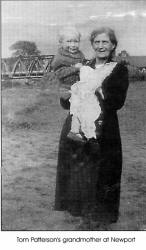 Mine was a home birth in the twenties, and in the
1920s and 30s few mothers-to-be went to hospital, thus the local midwife
known as Nurse Watters brought me into the world. Nurse Watters was an
institution in her own right. She went from home to home on her bicycle
and lived in a house at what is now known as Long Kesh. She had one
daughter; and was herself very hard of hearing. As I grew up
I remember her calling at our home to converse with my mother; they each
spoke at the top of their voices. In those clays, Nurse Watters' bicycle
outside a house generally meant that a baby was on its way. Her bicycle
had a little basket on the .front. I remember its
leaning against the hedge outside our home. Mine was a home birth in the twenties, and in the
1920s and 30s few mothers-to-be went to hospital, thus the local midwife
known as Nurse Watters brought me into the world. Nurse Watters was an
institution in her own right. She went from home to home on her bicycle
and lived in a house at what is now known as Long Kesh. She had one
daughter; and was herself very hard of hearing. As I grew up
I remember her calling at our home to converse with my mother; they each
spoke at the top of their voices. In those clays, Nurse Watters' bicycle
outside a house generally meant that a baby was on its way. Her bicycle
had a little basket on the .front. I remember its
leaning against the hedge outside our home.
My earliest memories were of fetching and carrying.
Newport was really just a little hamlet of houses, with no running
water; no electricity and dry toilets. There was a water pump by the
side of the road where everyone got their water. Water was carried in
buckets, and if you had two you made yourself a wooden frame, possibly
three feet square, placed it with a bucket on each side and the carrier
walked in the middle. The local people maintained the pump, only
requiring a piece of leather to be put round the `sucker' every now and
then.
All children played together in those days, games
such as 'hunt the deer', `marbles', rolling bicycle wheel
rims (hoops), and looking for bird nests occupied the long summer clays.
Living so near the Lagan Canal (now part of the
motorway) meant we fished and bathed in it in the summer; and in the
winter when it was frozen over we played on it. Winters were severe in
those days. Some of the families that made up Newport in the 1930s and
1940s were: Mulholland; Armstrong; Singleton; McGuigan; McCoy; Finn;
Hanna; Thompson; Jeffrey; Patterson; Fleming; Nicholl; Reid.
Everything had to be carried. At a very young age I
was sent for the milk each evening to the McCord 's farm. You went up
the lane through the railway bridge (still standing) with a tin can. Mrs
McCord would then take the tin from you and go to a large brown crockery
container (crock) and measure you a ladle full of milk. Each Saturday
you took the few pence to pay for the weeks supply. My elder sister
would have had to walk up to the shop where Mr Emerson made up your
order while you waited. Cars were few in the early
thirties, and when we saw one we often just stood and stared.
Boats going up and down the canal were also a source
of interest. Some were pulled by horses, a few had engines. Those that
had engines often had another barge in tow.
My family, the Pattersons, were sent to Hillsborough
Presbyterian School because the then headmaster, Mr McCready, asked my
.father to send us to keep the numbers up, thereby
keeping his wife in her job as a teacher in his school. I can remember
the embarrassment we felt as we met the Culcavey children coming down
the road to Newport School as we walked up the road one-mile to
Hillsborough. On looking back, it was a silly arrangement.
We walked everywhere, and I remember wearing boots -
no shoes. Clothing was handed down. As 1 was the second in the family I
had to wear my sister's Burberry coat as she grew out of it.
Holidays away from home were unknown. A day to
Newcastle (usually the Sunday School trip) was quite an event and much
looked forward to. In the 1930s and 1940s it was by train from
Hillsborough Station. Carriages were just added on to the normal
scheduled run. Very often several parties of children and their parents
were accommodated on the one train. Church parties from Lisburn and
Dunmurry were often together on the day outing to Newcastle. It took a
long time to cover the 26 miles of track, as the train would stop at
every little halt. I well remember the stationmaster walking up and down
shouting `Ballyroney' or some such place. Mothers had a hard day as
everything was packed into carrying bags for the journey.
Those who had gardens always worked them. Potatoes
and soup vegetables were the main crop. No artificials or pesticides
were ever used, just the spade, the fork and farmyard manure. In Newport
I remember the timid competition between the older men who had gardens;
it was always a source of conversation.
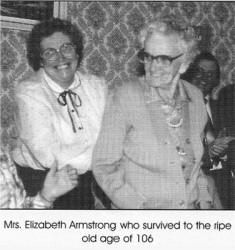 The radio, or wireless as it was then called, was a
prized possession. I remember our .first one well. We
listened to the fights as they were described blow by blow; and as war
approached our parents listened with apprehension. My father was a
veteran of the 1914-18 war and carried a war wound all his life, for
which, if I remember correctly, gave him a pension of �1 and 2 shillings
a month. He would let his pension accumulate, for a
few months and then my brother and I accompanied him into Tommy Duncan's
boot and shoe shop in Lisburn, where he would buy us boots, striking of
course the best price possible. `Haggling' was what they called it. The radio, or wireless as it was then called, was a
prized possession. I remember our .first one well. We
listened to the fights as they were described blow by blow; and as war
approached our parents listened with apprehension. My father was a
veteran of the 1914-18 war and carried a war wound all his life, for
which, if I remember correctly, gave him a pension of �1 and 2 shillings
a month. He would let his pension accumulate, for a
few months and then my brother and I accompanied him into Tommy Duncan's
boot and shoe shop in Lisburn, where he would buy us boots, striking of
course the best price possible. `Haggling' was what they called it.
I remember the wildlife of my childhood. There were
always swans and water hens on the canal, and in the really hot weather
pike would come to the top of the water, where we would flip them out of
the water onto the bank. There were also roach and large frogs in the
canal. Rabbits and hares were aplenty, especially along the railway
banks. Songbirds were in abundance and as a very young boy I remember
listening for hours on end to corncrakes answering each other
The trains and the, factory horn
were very much a part of our lives. Each time a train passed our bedroom
the windows rattled and we went to sleep and rose according to their
timetable. There was the ten past seven, the eight o'clock in
the morning, and so on. Very often there was no need to look at the
clock, the factory horn or the train told you the time of day.
The pace of life was leisurely and crime, such as it
was, was confined to being caught without a tail lamp on your bike. I
remember as a very young boy walking to school past Hillsborough Railway
Station and literally dozens of bicycles were lying on the grass banks
around the station. It seems few, if any, were stolen in those days.
Another recollection of the Halftown as a young boy
was of being sent down to buy paraffin oil off the Morgan family whose
house was on the left 500 yards past Newport School. George Hamlin also
had a smallholding, where he reared and fattened chickens and hens for
the market. I would have been given a purse with some money and sent
down for a 'boiling fowl'. He would kill the bird in front of
me, very expertly, put the change in the purse, hand me the still
kicking bird, and I would return home via the canal towpath.
The families of Halftown that most come to my mind
are: Berry; Palmer; Watters; Morgan; Beattie; Martin; Miller; McMinn;
Lappin; Scott; Finlay; Bingham; Kennedy; Hunter; McKelvey; Auld.

CHILDHOOD MEMORIES OF SUNDAY SCHOOL
Religious education and institutions formed an integral and vital part
of life in a by gone era. Bertie Emerson recalls his vivid memories of
his Sunday School days.
Every Sunday morning we were dressed in warm clothing
and hand-sewn boots made by Mr Turley, the cobbler from Hillsborough.
Off we went to Sunday School at Maze Presbyterian Church, which was more
than a mile away.
Out through the gate the six of us trooped on `Shanks
mare'. At Culcavey crossroads we took the Puddledock Road,
where we found other families from the village going to church. There
were rows of us, all across the road. Onward we went avoiding the
puddles until we reached Jackdaw Corner. Around this corner grew many
tall trees, with branches which hung over the road. Their trunks were
entwined with ivy which made them seem eerie. The jackdaws had built
their nests of twigs high up in the branches. On we went, a happy band,
and the noise we made attracted the animals in the fields, and they too
came to the side of the road and accompanied us on the inside of the
hedge as far as the fences allowed.
Below the high ground on the left was the site of the
original Methodist Meeting House (Priesthill), named after an area on
top of the high ground. There was a monkey puzzler tree in front of
Basil McApherson's house. Basil was the only man I knew who rode an
adult tricycle.
At Hooks Corner; turning right, we passed the second
site of the Methodist Church called Zion. This is a symbolic name for
the dwelling house of God. Recently after extensive improvements this
church has taken back its original name, Priesthill. We went over the
hump-backed bridge which spanned the canal, arriving at Sunday School.
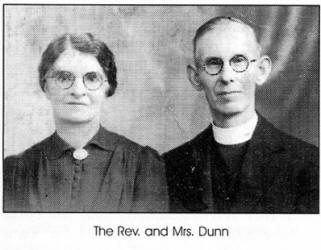 The Rev Dunn was a tall thin man, with a kind and
compassionate manner. He wore gold-framed glasses and a pork-pie hat.
This hat was so called because of its fanciful resemblance to a pork
pie, and was normal headgear for our ministers at that time. The Rev and
Mrs Dunn taught in Sunday School as well as several other teachers. At
no time was there a shortage of people capable and willing to teach
scripture. We learned by listening, singing, reading and repetition.
Passages of scripture, psalms and hymns were learned by heart as well as
the shorter Catechism. The class lasted one hour The Rev Dunn was a tall thin man, with a kind and
compassionate manner. He wore gold-framed glasses and a pork-pie hat.
This hat was so called because of its fanciful resemblance to a pork
pie, and was normal headgear for our ministers at that time. The Rev and
Mrs Dunn taught in Sunday School as well as several other teachers. At
no time was there a shortage of people capable and willing to teach
scripture. We learned by listening, singing, reading and repetition.
Passages of scripture, psalms and hymns were learned by heart as well as
the shorter Catechism. The class lasted one hour
At the end of the year we had an oral examination. I
can recall sitting at a rectangular table, at the end of which was a
paraffin oil lamp which gave out a bright light. This was my first exam,
and opposite me sat the examiner, the Rev David Hay of First Lisburn. I
could see he was wearing a dark suit and the traditional white collar
which encircled his neck. He looked gigantic, and the glow of the light
cast a long shadow on the end wall. The movements of his hands and head
caused the shadow to dance. My teacher pushed my chair close to the
table, for safety reasons no doubt. There I was, wedged in, just the two
of us in the room. As the Rev Hay looked across the table, he would only
see a small head, which I hoped would know the answer The first question
was "What is man's chief end?" I answered that one correctly, and a few
others as well. To some I answered, "I don't know".
The big social events of the year were the excursion
by train from Hillsborough Station to Newcastle, the congregational
social and the Christmas party.
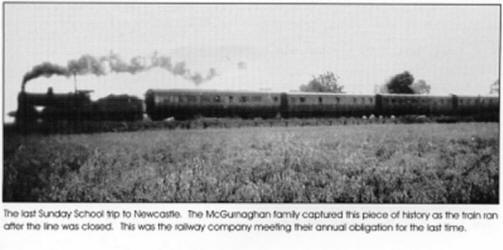
There was a thirty-minute interval between the end of
Sunday School and the commencement of the church Service. League of
Church Loyalty Cards for attendance were stamped. We normally went into
church, but if we had been told there was an open grave in the
graveyard, behind the church, we would go and see it because we would
have known the bereaved family. From a safe distance we looked at the
large pile of soil, and marvelled at the straight sides of the grave.
Many boys and girls knew the sorrow of death and had witnessed the
funerals of their brothers, sisters or parents.
The service commenced at mid-day and lasted at /east
one and a half hours. The Emersons sat on the left-hand side of the
Church. There were doors on the pews, and the aisles were the only parts
of the floor that were covered with cord carpet. Light was by oil lamps
suspended down from the ceiling. Later on these lamps were replaced by
electric light. This unadorned meeting house was in a non-conformist
style.
We carried our bibles and hymnbooks with us. Our
Sunday School teachers, the Misses Campbell, sat in the pew in front of
us � their brother was a blacksmith. On the wall behind the pulpit, and
high above the minister head, was painted in capital letters "WORSHIP
THE LORD IN THE BEAUTY OF HOLINESS".
An American organ provided music, and the organist
had to pedal fast 'to get the wind up' as it was colourfully
described. Had this not been so, the music would have sounded as though
the organ had laryngitis. The tempo of singing was slow; nevertheless it
was loud and sincere. We sang `Amen' at the end of each praise. Anthems
were a feature at special services and Harvest services. For the Harvest
the church was decorated with locally grown produce. Each year a frieze
of corn stalks about 18 inches deep and a foot thick was strung around
the pulpit. Grapes and bananas purchased from the shops hung over the
corn, and four or five stems of pampas grass stood guard at either side.
A smaller frieze of corn surrounded the choir stall.
Communion was celebrated twice per year: The church
was always packed, every family in their pew. We knew them all and they
knew us. The men wore dark three-piece suits, the waistcoats
of which were adorned with gold watch, pendant and chain. The ladies
wore their Sunday best, and crowned it all with a hat. When the minister
began his sermon, which we called `the long bit', the elderly men would
stretch their legs, lean back and close their eyes. I thought they were
asleep. Then we would nudge each other and smile. But the men were not
asleep. Silence reigned supreme and you could have heard a pin drop. No
one knew about microphones or loud speakers. Silence and closed eyes
increased your power q f comprehension. The Rev Dunn announced his text;
a passage taken from the Bible served as a theme to preach upon. He
elaborated on it and related it to everyday life according to the
scriptures. His sermon also had a moral teaching 'Honour thy father and
mother that their days may be long in the land that the Lord thy God
giveth thee'.
Another man who came to church fascinated me. He was
always late. He was tall and had his long white hair swept back. He sat
at the front. We knew him as `Tipperary Tim'. He was a
wanderer and slept under a starry sky. I imagined that he knew
everything about the flora and fauna of the countryside. He would leave
as we started to sing the last hymn. Tim was possibly closer to nature
than anyone else in the congregation, but he was just like the rest of
us. Everybody came because they realised the need to experience the
satisfaction of public worship. I saw Tim one sunny Sunday in May, and
thereafter no more. He had gone to his great reward.
When the sermon was over; the collection was lifted,
always by the same men. You put your money in a round wicker basked
lined with red soft felt. The baskets were placed on a seat behind the
organist. After singing the last hymn the Rev Dunn raised his right hand
and pronounced the Benediction. "NOW MAY THE BLESSING OF THE LORD AND
SAVIOUR JESUS CHRIST REST UPON AND ABIDE WITH YOU ALL, BOTH NOW AND
EVERMORE." We did worship the Lord in the beauty of holiness.

CULCAVEY 1934-1950
Thompson Crossey recalls characters and lifestyles in the district
before and immediately after the Second World War.
When I think back to my youth my immediate recall is
of the many characters that made up the village of Culcavey. From the
people who supplied the daily needs of the village, the source of
income, education and christian teaching, right down to the ordinary
working class men and women who were so much a part of my life.
It is difficult to make a starting point, so I will
recount as things come to memory.
My grandfather, William Crossey, came to Culcavey
.from Sandy Row, Belfast, and resided at No.10 Thompson's
Row. He worked on the Titanic in the shipyard, riding a bicycle there
and back to Culcavey. It was said that he grew the biggest leeks in the
country. He also worked with Johnstone the Lambeg Drum makers in Sandy
Row and brought a drum called `The Darkie' to LOL Lodge 111, Lower Maze.
This drum was reputed to be the best Lambeg drum in the country and it
is still in Lower Maze Orange Hall.
School was Newport Primary, where Mr JJV Boyd ruled
as Headmaster assisted by Miss Beattie. Between them they taught all the
children of the village and surrounding area. Mr Boyd came
from Athlone and he spoke with a brogue.
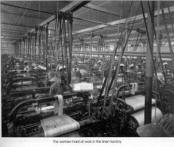 The main source of employment was the factory, or
Hillsborough Linen Company. Workers were alerted by a factory horn at
7.30 in the morning. At 8 o'clock the horn blew again signalling a start
to work. At 12.30 it sounded again for dinner and at 1 o'clock it again
signalled a start back to work. It echoed out again at 6 o'clock
to stop work for the day. The entire village used the horn as
their time guide. Times were hard for the workers. Bad batches of yarn
were the main reason for pay and argument. Some weavers blamed the `tenter'
for giving them a bad `beam'. On one occasion I remember quite clearly
my mother coming home with just sixpence in her pay bag. Pa McCandless
was the manager of the factory. He was feared and respected by most of
the workers, but was a fair man. When l started off in the `scrap
business' I operated between the gables of Thompson's Row and Puddledock
Row, what was in effect factory land. I worked here in the evenings
after having done my stint at Mackies in Belfast. Obviously someone must
have reported my making use of the land and I received a visit from Pa.
He arrived one evening and caught me at work, pointed out that I
shouldn't be carrying on my operations there and queried my working
hours. I told him I caught the 7.00 a.m. bus at the corner and arrived
home on the 6.00 p.m. at night. He commented on my hard graft and that
was the last I heard of the matter. Indeed a fair and just man who could
recognise a man's worth! The main source of employment was the factory, or
Hillsborough Linen Company. Workers were alerted by a factory horn at
7.30 in the morning. At 8 o'clock the horn blew again signalling a start
to work. At 12.30 it sounded again for dinner and at 1 o'clock it again
signalled a start back to work. It echoed out again at 6 o'clock
to stop work for the day. The entire village used the horn as
their time guide. Times were hard for the workers. Bad batches of yarn
were the main reason for pay and argument. Some weavers blamed the `tenter'
for giving them a bad `beam'. On one occasion I remember quite clearly
my mother coming home with just sixpence in her pay bag. Pa McCandless
was the manager of the factory. He was feared and respected by most of
the workers, but was a fair man. When l started off in the `scrap
business' I operated between the gables of Thompson's Row and Puddledock
Row, what was in effect factory land. I worked here in the evenings
after having done my stint at Mackies in Belfast. Obviously someone must
have reported my making use of the land and I received a visit from Pa.
He arrived one evening and caught me at work, pointed out that I
shouldn't be carrying on my operations there and queried my working
hours. I told him I caught the 7.00 a.m. bus at the corner and arrived
home on the 6.00 p.m. at night. He commented on my hard graft and that
was the last I heard of the matter. Indeed a fair and just man who could
recognise a man's worth!
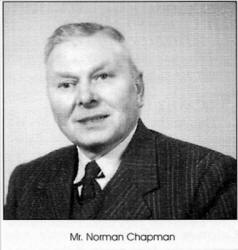 Norman Chapman was the engineer in the factory. He
was educated in the Public Elementary School and Lisburn Tech. A very
intelligent man, he read a lot and loved to engage in conversation with
anyone on any subject. Lizzie Chapman, Norman's mother, ran a small shop
at Smithy Row, beside the old oak tree which was near the factory gate
and which is still growing there. She was a very refined woman. Norman Chapman was the engineer in the factory. He
was educated in the Public Elementary School and Lisburn Tech. A very
intelligent man, he read a lot and loved to engage in conversation with
anyone on any subject. Lizzie Chapman, Norman's mother, ran a small shop
at Smithy Row, beside the old oak tree which was near the factory gate
and which is still growing there. She was a very refined woman.
When the Factory closed for good I, then owning a
scrapyard in the Old Railway Station, bought all the looms and machinery
in the factory and smashed them all up .for scrap metal and
removed them from the premises. A sad end for an old establishment, and
on recollection maybe the antiquity of the items outweighed the value of
the scrap metal!

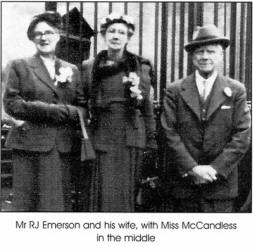 The Emerson family was well known in the village as
the owners of Culcavey Stores, the local shop. RJ Emerson (Rabbie John),
the head of the family, was assisted in the shop by his sister-in-law
Miss McCandless and his daughter Eileen. Miss McCandless was a proper
lady, very polite and mannerly. Eileen was also a lovely lady. Mrs
Emerson was a well thought of quiet lady, who ran the home. Bertie, the
son who looked after the .farm, provided the supplies of milk
in the village, for many years. In his youth he attended the
Agricultural College and one occasion when he was speaking on Radio
everyone in the village was listening in. Rabbie John was a well-known
man and was a Justice of the Peace. He also wrote many poems, some about
what was happening in the village. The Emerson family was well known in the village as
the owners of Culcavey Stores, the local shop. RJ Emerson (Rabbie John),
the head of the family, was assisted in the shop by his sister-in-law
Miss McCandless and his daughter Eileen. Miss McCandless was a proper
lady, very polite and mannerly. Eileen was also a lovely lady. Mrs
Emerson was a well thought of quiet lady, who ran the home. Bertie, the
son who looked after the .farm, provided the supplies of milk
in the village, for many years. In his youth he attended the
Agricultural College and one occasion when he was speaking on Radio
everyone in the village was listening in. Rabbie John was a well-known
man and was a Justice of the Peace. He also wrote many poems, some about
what was happening in the village.
The other members of the family were all well educated
and the village people were very proud of their achievements. Some were
doctors and one was a teacher The late Dr Douglas Emerson was one of the
most highly respected doctors in the country.
Another local shop was a small wooden hut built at
Culcavey crossroads by Harry Ginn. Harry was a real character who took a
great interest in council facilities and stood in elections. The hut
later became 'Thompson's wee shop', trading at the crossroads
for many years.
Back in the days of no supermarkets the people relied
heavily on the local shop. Other services were provided in different.
forms. Mr Bell was the dentist. He attended people in their own house or
in Miss Maggie Mercer's home. He came every Friday night with his small
bag. Another Mr Bell, 'Bomp Bomp' by nickname, was the shoemaker He made
shoes for some people and provided a mending service. Sammy Miller was
the vegetable man. Fish men came round shouting "Ardglass herrings ".
The village was visited weekly by two ice-cream men. Tommy Just from
Lisburn and an Italian man from Newry who came every Friday night and on
Sunday. Johnny Palmer came round with goods and oil and Billy Balmer
came round selling bread and pastry. The `pack men' came round the
village on a Friday night (pay night). Bobby McBride and a Mr Sharkie
came round with a suitcase full of new clothes. They had a lot of
customers. People got what they wanted from the suitcase or else they
ordered the item and they would get it the next week. They paid for
everything at a certain amount of money per week. Many a bride and
bridegroom were fitted out in this manner.
In all villages there was a local woman acting as
midwife. The midwifery service in Culcavey was the province of Mrs
Wilson, wife of Mr William Wilson, Snr. My recollection is that they
were from the South of Ireland. The doctor was only called to a
difficult birth, so Mrs Wilson acted as midwife to all the pregnant
women in the village. William Wilson was a big strong man who was always
working in his back yard where he kept goats and pigs. When Billy
Miller; the pig butcher was killing the pigs, the whole village could
hear the squeals before they were killed. Some people used to buy some
fresh liver for food.
If you were lucky to own a bicycle you would surely
need the services of Tommy Crothers. Tommy ran a small bicycle shop at
the quay which was' beside the canal at Newport. He repaired all the
cycles in the village. Renowned for a bit of good 'craic', he was known
to be fond of a bottle of stout. As none of the `working class' owned
cars many people had bicycles that were treasured as they provided the
means of travel the few miles or so to work. This meant there was' a
supply of second-hand parts from which many of the boys built 'an old
bike'.
Also residing clown beside the canal was Mrs
McGuiggan, the Newport woman who made banners and bannerettes for the
Orange Order. She was a member of Annahilt Presbyterian Church, and rode
on her bicycle to that church each Sunday.
For postal services there was Bob McAdam. Bob was
postman for many years and knew everyone in the district. He was a good
Lambeg drummer and followed the drums everywhere, and was a lifetime
member of Hillsborough Lodge 144. He also followed the local football
team and was a keen supporter of `The Blues' (Linfield).
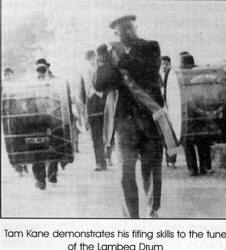 The village people were always proud
of the men who fought in both World Wars.
Tam Kane was a big man who soldiered in the First World War, and saw
service in the worst of the
fighting before being wounded and brought home. He became SDC of the `B
Specials' in Hillsborough � a post he held for years. The Kanes were a
military family. Bobbie and Eddie were two professional soldiers in the
Second World War. Bobbie was a Pipe Major and Eddie was mentioned in
despatches while fighting in Africa. Tam Kane was very fond
of playing in the card school on
the railway lines. When he got a winning hand he could be heard to
shout, `Come up to Brimmies', a place in France soldiers used to shout
about. Tom could also play the fife in tune
to the Lambeg drums. The village people were always proud
of the men who fought in both World Wars.
Tam Kane was a big man who soldiered in the First World War, and saw
service in the worst of the
fighting before being wounded and brought home. He became SDC of the `B
Specials' in Hillsborough � a post he held for years. The Kanes were a
military family. Bobbie and Eddie were two professional soldiers in the
Second World War. Bobbie was a Pipe Major and Eddie was mentioned in
despatches while fighting in Africa. Tam Kane was very fond
of playing in the card school on
the railway lines. When he got a winning hand he could be heard to
shout, `Come up to Brimmies', a place in France soldiers used to shout
about. Tom could also play the fife in tune
to the Lambeg drums.

Another villager who joined the Royal Navy before the
Second World
War was Peeler McAdam. On two occasions the ships
that he was on were torpedoed and sunk by the German U-boats. When he
returned home he got a great reception.
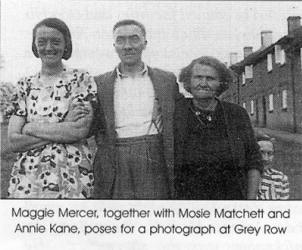 Jack Woodhouse was an English soldier who came to the
castle in Hillsborough. He married Bella Matchett, a Hillsborough girl,
and they settled in Culcavey. Jack had good community spirit. He got
involved in everything that took place in the village. He was MC in the
Saturday night dance in 'Ritchie's Hut' for many years. Ritchie's Hut
was the dance hall where many of the boys met girls, especially the
soldiers who were stationed in Hillsborough. Maggie Mercer, an unmarried
lady, who lived in the village all her life, was always called to sing
at the dances, her speciality being `Let him go and let him tarry'.
Maggie was known to everyone in the village, and took a keen interest in
the life and events of the area. Jack Woodhouse was an English soldier who came to the
castle in Hillsborough. He married Bella Matchett, a Hillsborough girl,
and they settled in Culcavey. Jack had good community spirit. He got
involved in everything that took place in the village. He was MC in the
Saturday night dance in 'Ritchie's Hut' for many years. Ritchie's Hut
was the dance hall where many of the boys met girls, especially the
soldiers who were stationed in Hillsborough. Maggie Mercer, an unmarried
lady, who lived in the village all her life, was always called to sing
at the dances, her speciality being `Let him go and let him tarry'.
Maggie was known to everyone in the village, and took a keen interest in
the life and events of the area.
Deeds and happenings were well talked of within the
close community of the village. One event I remember well was the act of
John McFarland. John's father was a Scotsman, who came down each
Saturday to collect his wages. While his father might have been
pecuniary John himself is remembered for rescuing John Singleton and Day
Patterson from drowning after they had fallen into the canal at Newport
Quay.
For this act he was awarded the Humane Medal. The
little ceremony awarding the medal took place on Newport Bridge,
officiated by Canon Mitchell of Eglantine Parish Church. This must have
been in 1938.
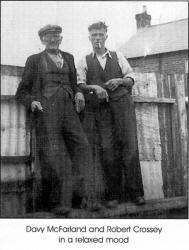 Many too will remember the acquisition of land by
Tommy Alexander `Big' Tommy, as we knew him, was a man of good quality.
He bought a patch of ground that was covered with some of the oldest
trees in the land. To get this land cleared he gave the men of the
village one tree each. With spades, hatchets and crosscut saws they
cleaned the ground in six months. Tommy then turned the cleared area
into a very prosperous nursery. He employed some of the school children
after three o'clock to work at the lettuce and tomato plants,
and there was no shortage of labour Many too will remember the acquisition of land by
Tommy Alexander `Big' Tommy, as we knew him, was a man of good quality.
He bought a patch of ground that was covered with some of the oldest
trees in the land. To get this land cleared he gave the men of the
village one tree each. With spades, hatchets and crosscut saws they
cleaned the ground in six months. Tommy then turned the cleared area
into a very prosperous nursery. He employed some of the school children
after three o'clock to work at the lettuce and tomato plants,
and there was no shortage of labour
As you get older some names and faces become
memorable, sometimes for just small reasons, or perhaps it's
because you can relate events to these people. I remember Bob Armstrong
who rose each morning at 4.30 to 5.00 am. and rode his bicycle to
wherever his steam engine was working. His steam engine was used to make
the `copper' cam when Newport Bridge was built
after the old iron bridge collapsed. When I see hats I always think of
Bertie Carr: Bertie was a `bookies' clerk. He
lived at Railway Terrace and was always well dressed, wearing the best
kinds of hats in the village. As a very enthusiastic fisherman,
everybody wondered how he could catch so many fish. Again, I can see
today, as plain as if it was yesterday, Davy Finlay who lived between
Newport Bridge and the Moss Road. Davy kept a small shop and never
seemed to wash his face. The hens, ducks and guinea hens all lived in
the house along with the family. The door to the house was never shut.
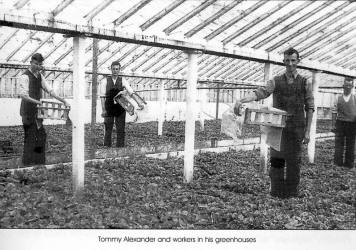 The antics of three local farmers always brings a
smile to my face. Hubert Nelson, Charlie McBride and Wilson Verner met
every Saturday night in Nelson's pub in Smithfield Square, Lisburn. They
always got the 10.30 bus to Flatfield on the way home. Of course they
had plenty of money, but .for devilment they refused to pay
the conductor their fare. Some conductors knew how to handle them, but
others who didn't know were in trouble. However; the last man off the
bus usually had to pay! The antics of three local farmers always brings a
smile to my face. Hubert Nelson, Charlie McBride and Wilson Verner met
every Saturday night in Nelson's pub in Smithfield Square, Lisburn. They
always got the 10.30 bus to Flatfield on the way home. Of course they
had plenty of money, but .for devilment they refused to pay
the conductor their fare. Some conductors knew how to handle them, but
others who didn't know were in trouble. However; the last man off the
bus usually had to pay!
At the other end of the scale I remember the refined
Mrs Pimm who lived in a large house at the top of the factory hill. She
was a lady who kept herself to herself and was seldom seen in the
village. However the villagers showed her great respect.

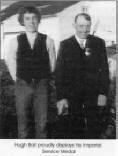 Few people could not remember Hugh Ball. Hugh married
Maggie Cargin and came to the village to live. His great passion for
hunting rabbits was well known throughout the country. Hugh kept an
excellent dog for hunting called Queenie. He also reared some of the
best ferrets in Ireland. Hugh started work in Hillsborough Forest when
he was thirteen. He never went to school and could not read or write. As
a Forestry employee he was horseman and gamekeeper, and was awarded the
Imperial Service Medal, which was presented to him at Hillsborough
Castle. He apparently never took a holiday, but preferred to go in to
attend the horses or go hunting in the forest with his ferrets and dog. Few people could not remember Hugh Ball. Hugh married
Maggie Cargin and came to the village to live. His great passion for
hunting rabbits was well known throughout the country. Hugh kept an
excellent dog for hunting called Queenie. He also reared some of the
best ferrets in Ireland. Hugh started work in Hillsborough Forest when
he was thirteen. He never went to school and could not read or write. As
a Forestry employee he was horseman and gamekeeper, and was awarded the
Imperial Service Medal, which was presented to him at Hillsborough
Castle. He apparently never took a holiday, but preferred to go in to
attend the horses or go hunting in the forest with his ferrets and dog.
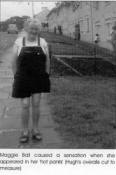 One of the most important sports during the 1930's
and 40's was football, and Culcavey always had a good team. They played
under the naine `Distillery', which came from the old distillery that
had been in the village before the advent of the linen factory.
Competition was very strong as all the local towns and villages had
teams, and of course there were star players. To name but a few: Albert
Pollock; the Wilsons; the McDonalds, Johnstone, Cairns and `Head,
heel toe' Sammy Atcheson. To think of Sammy is always to think of
football. He was a very lively man and was a really good centre forward
for the local team. Everyone used to hear him shout `Head, heel or toe,
let her go'. On one occasion he won a considerable amount of money on
the football pools, and this was the talk of the village. Sammy became a
born-again Christian, and .for many years he preached in
Lisburn Square on a Saturday night in front of a
good crowd of people. He paid visits to all the sick people in local
hospitals. One of the most important sports during the 1930's
and 40's was football, and Culcavey always had a good team. They played
under the naine `Distillery', which came from the old distillery that
had been in the village before the advent of the linen factory.
Competition was very strong as all the local towns and villages had
teams, and of course there were star players. To name but a few: Albert
Pollock; the Wilsons; the McDonalds, Johnstone, Cairns and `Head,
heel toe' Sammy Atcheson. To think of Sammy is always to think of
football. He was a very lively man and was a really good centre forward
for the local team. Everyone used to hear him shout `Head, heel or toe,
let her go'. On one occasion he won a considerable amount of money on
the football pools, and this was the talk of the village. Sammy became a
born-again Christian, and .for many years he preached in
Lisburn Square on a Saturday night in front of a
good crowd of people. He paid visits to all the sick people in local
hospitals.
Other sporting diversions also occupied much
appreciated spare time. A game that was played in the early party of the
century was called `bowls', not the sane as a game of `bowls' played
today. A group of men gathered at a point on the road. Another point on
another road was picked. In turn they `hinched' a stone called a
`bullet', The person who covered the distance between the two points
with the least number of throws was the winner
Skittles were also played. A circle 2 feet 6 inches
in diameter was drawn on a level part of the road. It was divided into
four quarters. A skittle was stood on end in the centre of the circle
and one stood on end on each of the four quarters. A player stood at the
butts, which was some distance from the circle. He had three skittles
which he threw at the circle, one at a time. The idea was to knock the
other five skittles out of the circle. The number of skittles
knocked out of the circle decided the winner. This game went on for
hours. Skittles were usually cut about 12 inches long from an ash tree.
The younger boys of the village had games of their
own to play. A race up the front of the houses and down the back with
`hoops and cleaques' by a dozen or more boys made a terrible
noise. They also played `Hunt the deer', Blind man's
buff' and `Hide and Seek'.
`Chestnuts' was a seasonal game. "Are you coming for
a game of cheesers?" was the usual question. We gathered chestnuts in
the glen, Harry's Road, Aughnatrisk Road, and the `Plantin'.
Although `Chestnuts' is a very old game, the generations of today still
know how to play it.

WORKING WITH MY FATHER
Thomas Palmer, a well-known local businessman from the Halftown area,
recalls his experiences.
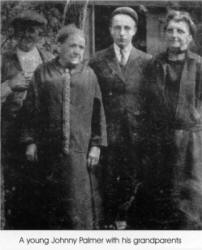 I believe I was seven years old when 1 was first allowed
to go out on the van with my father � a special birthday treat. At the
time we were living in the old railway station at Hillsborough, the shop
and the pumps at Spruce field having been vested by the government
.for the construction of the Ml Motorway. For a delivery vehicle
we had a green Commer 15 cwt van and there was not much room, even for a
small boy, given the range of items packed into the van. I believe I was seven years old when 1 was first allowed
to go out on the van with my father � a special birthday treat. At the
time we were living in the old railway station at Hillsborough, the shop
and the pumps at Spruce field having been vested by the government
.for the construction of the Ml Motorway. For a delivery vehicle
we had a green Commer 15 cwt van and there was not much room, even for a
small boy, given the range of items packed into the van.
I did not have a proper seat as such � I had to lie
on a coat, which was put on top of the potatoes. The potatoes were
weighed and put on the van in full-size metal biscuit tins � when
customers bought a stone of potatoes they emptied them into a box and
gave us back the tin. In addition, �
stone (71b) of potatoes were sold in brown paper bags � plastic bags
were a much later invention. Blues were the main eating potato at that
time and very few whites were sold. Similarly, white eggs
were generally the only eggs available � compare that to today where
white potatoes and brown eggs especially, dominate the market place.
On school holidays it was the done thing that either
myself or my brother, or one of my sisters, went on the van with my
father to give him a hand. When the weather was good it was pleasant and
interesting, especially going into farmyards, lifting produce and
getting the odd ride on a tractor; be it with Kennedy Hunter or Billy
McCoy. Going around the estates meant that you got to know a large
number of people and saw a wider picture of life.
Some house calls were special, where you would be
given a cup of tea, a biscuit, or in some cases a cup of lemonade, and
the use of a toilet. There were various points around the country where
you could stop and have something to eat, e.g. at Smith Lane en route
from Culcavey, but before hitting Coronation Gardens. During the winter
we would have a flask of soup and sandwiches, but in the summer it would
be lemonade, sandwiches and biscuits.
Various world events also happened when I would be on
the van with my father I remember us being at Lily Porter's house in
Coronation Gardens when Thompson Crossey came over to the van and
announced that Kennedy had been shot. I didn't real/v know who Kennedy
was then, but like most other people, I now know where I was when
Kennedy was shot. Another important event was van walking on the moon,
and we were making our usual Saturday call at Maria McGuriiaghan's
on the Blaris Road when Gerald McConville came out to the van and said I
should come in and see man walking on the moon tar the first time. The
house had no electric at the time, but Gerald had a TV that worked off a
car battery. He would leave it round to the shop, strapped to the
carrier on the back of his bike, to get it charged and we would leave it
back on a Saturday during our delivery. Gerald had recognised that this
was a unique event in world history and he ensured I was able to witness
it. Incidentally, there was also a very large horse drawn cart in Maria's
barn, which I would look at every Saturday, thinking what it had been
used for and when it was last used. Given the moral upbringings of the
time, the rule was that small boys were seen and not heard and I have
yet to find an answer to my questions.

|